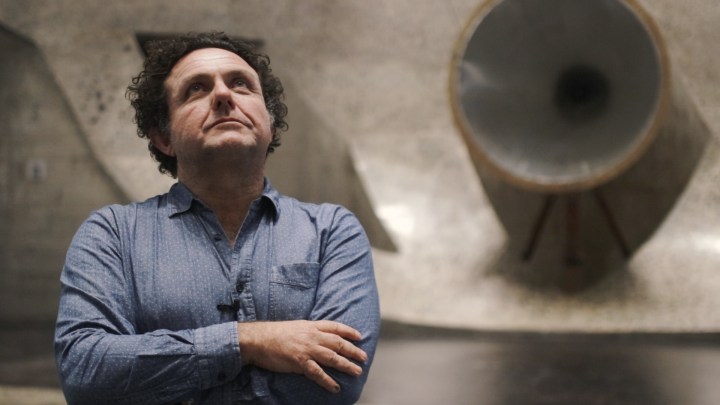Maverick Life Art
On listening, dissonance and chaos: How composer and musician Philip Miller turns sound into art

From Johannesburg’s electric fences, to the sounds of the Church of Shembe or the Paris metro, composer Philip Miller is always listening.
Video filmed & edited by Malibongwe Tyilo
“… There are soundtracks to living in Johannesburg, whether it’s the taxis, the sounds of hawkers on the streets, the Shembe … there’s so many … In the suburbs, the sounds of electric fences, the hadeda …” explains composer and self-described “sound magpie”, Philip Miller. “I pick up sounds wherever I go. They’re kind of like a library, a store.”
He has a point about the Johannesburg sounds: In the deluge of sensory input we receive daily, sound is arguably even more omnipresent than sight. And as much as there are visual variations between different cities, countries, villages, townships and towns, there are also different soundscapes and sound textures accompanying every visual, every location, every moment. Until one surrenders to sleep, there is endless acoustic input. Even then, with eyes shut, the flow of sound seems to continue, relentless. What we perceive as silence in our day-to-day lives is not really an absence of sound, be it the hum of air conditioners, the drone of cars far away, birds, wind, crickets; even in our most silent moments and spaces, sound fills every nook and cranny, even as we’re oblivious to it.
“Silence is a sound … Silence can be a really important part of … of listening and composing. Silence is as important as hearing a note or a voice,” says Miller.
Maverick Life caught up with the internationally acclaimed, award-winning composer and sound artist in August 2019 at the Zeitz MOCAA, just as he was preparing two sound pieces for the opening of William Kentridge’s largest exhibition in South Africa, which opened on the 24 August 2019 and will run until the 23 March 2020.
The pair have collaborated on various pieces for over a quarter century, dating all the way back to 1993 when Miller wrote the score for Kentridge’s celebrated film, Felix in Exile.
Minor spoiler alert should you decide to watch the filmed interview, too: we asked Miller, “What is the sound of now?” to which he responded: “To some extent, I think it is the sound of shouting. I think it is the sound of not listening. Right now, for me, there’s a lot of noise and raucousness, and people are talking over each other. They’re not always listening to each other. I constantly hear people talking over each other … If you were to talk about it musically, we’re definitely not in some kind of harmonious ‘call and response’. I think we’re much more at the moment … where we’re kind of converging into a sort of dissonance and chaos. Sometimes, out of the dissonance comes a voice that then says to us … Something human about us as South Africans. I think that we have to almost pull ourselves back and go quieter.”
Miller completed his postgraduate studies in electro-acoustic music for film and television; he has also studied with several composers in Cape Town as well as the United Kingdom. He’s created soundtracks for several films, and won awards for some, including the Best Original Music Score award at the Canadian Screen Awards in 2016 for The Book of Negroes, a miniseries adaptation of Canadian writer Lawrence Hill’s award-winning novel, starring Louis Gossett Jr. and Cuba Gooding Jr. In 2013, he scored an Emmy nomination for Best Music Composition for his soundtrack to the HBO film, The Girl.
Although well-travelled and classically trained, the now Cape Town-based composer credits South Africa, specifically Johannesburg, with influencing and forming his sound language. However, he is careful not to box his sound as strictly South African.
He explains: “There are elements that resonate to my South Africanness. But I would hope that I talk further than that and that my experience goes a lot further. I moved from classical music into a sort of very non-classical and much more open world of all kinds of different music in South Africa, which you have to do if you really want to embrace South African music and culture, you can’t just think in narrow ways.”
South Africa’s sonic world has been captured in many pieces by Miller: there is his opera, Extracts from the Underground, in which the composer explores “the subterranean sound world of miners in South Africa”; or Rewind, a Cantata for Voice, Tape and Testimony (2007), based on the testimonies of the Truth and Reconciliation Commission – the piece became an award-winning choral work; and BikoHausen: Steve Bantu Biko and Karlheinz Stockhausen in Johannesburg in which Miller conceives, in collaboration with Siya Makuzeni, Ann Masina, Tlale Makhene, Bham Ntabeni, Waldo Alexander and Vus’umuzi Nhlapo, an imaginary conversation between Biko and Stockhausen after the two met in March 1971.
And now, in the two pieces currently playing at the Zeitz MOCAA as part of Kentridge’s exhibition, which he also shares and speaks at length about in the filmed interview above. We get to visit his “sound library”, and experience moments of historical significance through sound. One of the two pieces, called Counting Numbers is, “a meditation on the numbers, the vast numbers of black Africans who died in The First World War in Africa.”
The second piece, A Canon for Isaiah Shembe, Miller describes as “a piece that looks at the sound world of Johannesburg.” It is inspired by sounds of the horn and singing of the church of Shembe in Johannesburg. It is, according to Miller, “a piece that also in some ways brings Johannesburg into Cape Town, into the Zeitz MOCAA”. ML

















 Become an Insider
Become an Insider